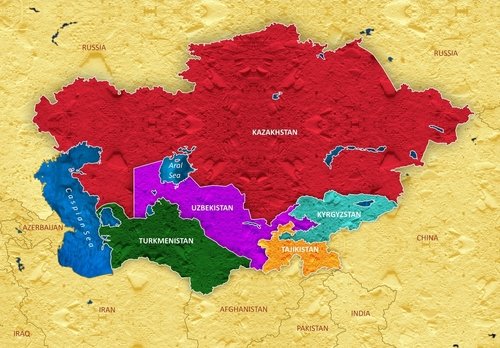Belgium (Brussels Morning newspaper) Europe has traditionally focused its strategic attention on the West or its immediate eastern neighbors. However, as the global geopolitical landscape evolves, a case for looking further east, towards Central Asia, becomes compelling.
With energy security at the forefront, recent diplomatic activities and strategic agreements suggest that Europe should be more engaged with this region.
Given European nations’ intent to mitigate energy security issues, primarily their dependence on Russian energy, diversifying energy sources is essential. Strengthening ties with Kazakhstan, the largest of the Central Asian states both geographically and economically, can offer a solution to Europe’s energy concerns.
Kazakhstan’s abundant oil and mineral reserves have already allowed it to supply oil to the German market through the Druzhba pipeline, with the potential to increase volumes.
Yet, beyond immediate energy sources lies the potential for a green energy transformation. Rare earth metals, crucial for this shift, are abundant in Kazakhstan and several other Central Asian nations.
These metals are pivotal for manufacturing a range of technologies, from smartphones to electric vehicle batteries. Given the rising significance of these technologies, diversifying Europe’s rare earth supply chains is critical. Consequently, cementing ties with Central Asian nations could strategically address this need.
However, many supply chains and primary trade routes from Asia to Europe pass through Russia, posing potential complications if relations remain strained or deteriorate further.
This highlights the necessity for alternative trade conduits. Both European and Central Asian countries have voiced interest in creating alternative routes.
The Trans-Caspian Trade Route or Middle Corridor, which bypasses Russia via the South Caucasus and Kazakhstan, is one such promising solution.
The efficiency of this route is evident, with transport times diminishing from 38-53 days to 19-23 days, and an aspiration to further reduce to 14-18 days.
On his Berlin visit towards the end of September, Kazakhstan’s President, Kassym-Jomart Tokayev, accentuated this potential, suggesting integration of the Trans-Caspian route with the Trans-European Transport Network and the EU’s Global Gateway initiative.
Recent economic data emphasizes the flourishing ties between the EU and Kazakhstan.
The trade turnover in 2022 reached 40 billion US dollars, and the foreign direct investment for the same year was 12.5 billion US dollars, marking a 23% increase from the prior year.
During the 20th Kazakhstan – EU Cooperation Council meeting in Luxembourg on 24 October, the Foreign Minister of Kazakhstan, Murat Nurtleu, highlighted the strategic importance of the cooperation between Kazakhstan and the European Union, emphasizing that Kazakhstan will remain a reliable partner for the EU in Central Asia.
In the current geopolitical framework, Central Asia’s role is becoming increasingly relevant. Engaging more deeply with this region not only offers Europe a strategic advantage but also ensures it remains an influential player in global geopolitics.
The 19th Central Asia – European Union Ministerial meeting on 23 October in Luxembourg, attended by foreign ministry heads from both regions, reinforced this commitment. In the joint communique, the EU and the five Central Asian countries confirmed their joint commitment to continue their strategic partnership.
They reaffirmed their political willingness to further strengthen their partnership based on shared values and mutual interests, as exemplified by the meetings of the Heads of State of Central Asia and the President of the European Council on 27 October 2022, in Astana, Kazakhstan and on 2 June 2023, in Cholpon-Ata, Kyrgyzstan.
The participants also endorsed the Joint Roadmap for Deepening Ties between the EU and Central Asia, signifying a major milestone in their relations.
It outlines key areas for practical cooperation, such as aligning the region’s transport network with the Trans-European Transport Network (TEN-T), jointly developing critical raw materials, financing green projects in the region, and collaborating on phytosanitary and veterinary measures, among others.
They also stressed the need to intensify cooperation on sustainable connectivity between the EU and Central Asia in the areas of trade, transport, energy, digital, and people-to-people contacts.
In the midst of the expanding economic partnerships and strategic alignments, it is important not to overlook the impending challenges of climate change.
Central Asia and Europe both recognize the mutual benefits of tackling this global issue collectively.
At the Central Asia – European Union Ministerial Meeting, Kazakh Foreign Minister Nurtleu underscored the urgency and significance of climate change cooperation for the Central Asian region.
Kazakhstan, as part of its environmental commitment, has set forth a goal to achieve carbon neutrality by 2060.
While this is an ambitious target, it demonstrates the nation’s intent to align with global efforts to counteract climate change. On the international stage, Kazakhstan is also preparing to host the UN Regional Climate Summit in 2026. The summit is expected to bring together nations to discuss and strategize on climate change mitigation and adaptation efforts.
The EU and Central Asian countries, amidst their economic and strategic dialogues, also find common ground on the pillars of international governance.
Both parties have consistently expressed their unwavering commitment to the United Nations Charter and the foundational principles of international law. Crucially, they have jointly emphasized the utmost importance of respecting the independence, sovereignty, and territorial integrity of all states.
This alignment not only solidifies their diplomatic relations but also sends a clear message about their joint stance on global geopolitical issues and adherence to international norms.
In sum, Europe’s trajectory toward a prosperous and secure future is deeply interwoven with its ability to cultivate and nurture relationships beyond its immediate vicinity.
Central Asia, with its vast resources and strategic positioning, presents not just an opportunity, but a beacon for Europe’s aspirations in energy security, green transformation, and geopolitical balance.
In this evolving global landscape, where challenges and opportunities coexist, Europe must not only recognize the immense potential Central Asia offers but also proactively engage in deepening its ties, fostering collaboration, and building a shared vision for the future.




